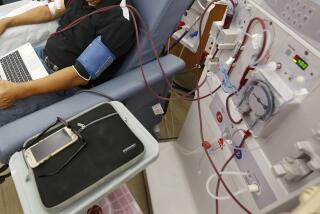Diet Affects Organ Transplant
- Share via
Animal studies indicate that dietary changes in kidney donors may help prevent the rejection of transplanted organs in recipients, researchers said last week.
Researchers at Washington University’s medical school found eliminating nearly all fat from rats’ diets for two months before they donated kidneys dramatically improved the survival rate of rats receiving the kidneys.
“It is an interesting manipulation to do in laboratory animals, but it is not nearly as easy to make such radical dietary changes in people. . . . I don’t think you could do it ethically,” said Dr. James Lefkowith of the research team.
Although the rats on the fat-free diet survived on the regimen, Lefkowith said their growth was retarded and they suffered from dermatitis and water leakage through the skin.
In a study published in the journal Science, researchers found depriving donor rats of essential fatty acids depleted their kidneys of white blood cells that play a key role in the body’s immune responses.
Although they were given no drugs to prevent their immune systems from attacking the transplanted kidneys, recipient rats showed no evidence of organ rejection.






